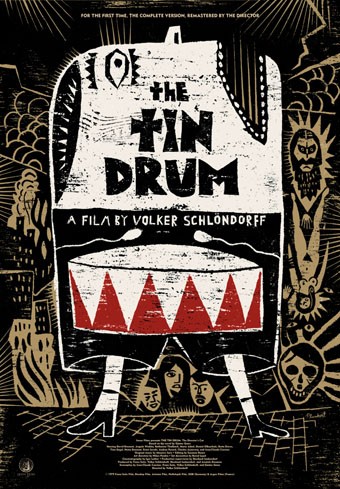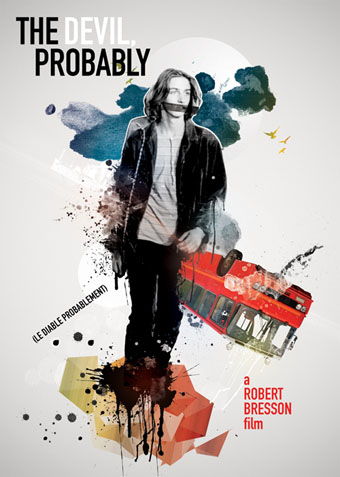The list of all possible contenders for the Academy Award for Best Foreign Language Film, to be presented February, is nearly complete, and a few of them will be screened at the New York Film Festival over the coming weeks: Michael Haneke‘s Amour (Austria), Jun Robles Lana’s Bwakaw (Philippines), Pablo Larraín‘s No (Chile), Cristian Mungiu’s Beyond the Hills (Romania), and Christian Petzold‘s Barbara (Germany).
Janus Films is currently sending a past winner around the country; not only did Volker Schlöndorff‘s The Tin Drum (1979) win that coveted Oscar, it won Cannes’ Palme d’Or as well. The newly restored director’s cut (4 out of 4 stars from Ela Bittencourt in Slant) slips back in the 20 minutes cut for distributors at the time. Eric Rentschler for Criterion in 2004: “Rather than trying to impose a personal style on [Günter] Grass’s epic or to mimic the novelist’s idiosyncratic prose and the complexities of his multilayered narrative, Schlöndorff approached the work less as an auteur with his own vision than a metteur en scène with an ethos of precision and craft. Above all, he set out to capture the novel’s singular recreation of the German past.” The Tin Drum is screening at New York’s Film Forum through tomorrow, then heads to San Francisco’s Berlin & Beyond Film Festival, where it screens on Saturday, then to Austin on October 4 and Seattle in December. Last week, Schlöndorff was a guest on the Leonard Lopate Show.
Also making the rounds, albeit at more theaters is How to Survive a Plague. Melissa Anderson in the Voice: “In his filmmaking debut, journalist David France, who wrote the first story about ACT UP for this publication, assembles a thoroughly reported chronicle of that direct-action advocacy group’s most vital era, from its founding in 1987 (six years into the AIDS epidemic) through 1995. Expertly compiled from hundreds of hours of archival footage—depicting fractious meetings, infamous demonstrations like 1989’s die-in at St. Patrick’s Cathedral, and hospital visits with the gravely ill—France’s documentary captures the fury and unflagging commitment of ACT UP to target those in power who did nothing to stop the disease. Present-day interviews with members who in 1987 doubted they’d live to see their 30th birthday deepen the film’s impact as an essential document of queer—and New York City—history.”
More from Anthony Kaufman (Sundance NOW), Steve Macfarlane (Brooklyn Rail), Ray Pride (Newcity Film), Joshua Rothkopf (Time Out New York, 5/5), Paul Sbrizzi (Hammer to Nail), and Scott Tobias (AV Club, B+). Interviews with David France: David Fear (TONY), Steve Erickson (L), and Anya Jaremko-Greenwold (BOMB).
DVD/Blu-ray. David Sterritt for Criterion on The Game: “At once an elegantly constructed maze, a rambunctious Hitchcockian thriller, a multifaceted pulp fiction, and a stylish nightmare that Rube Goldberg might have invented, David Fincher’s crazy-lucid masterpiece is also a canny psychological study of an imperiled mind and a satire of contemporary capitalism that is even more timely today than when it premiered in 1997. There has never been another movie like it, even from Fincher, who reveals his creative personality more fully here than in any other film, Fight Club (1999) and The Social Network (2010) included.” More from Chris Cabin (Slant, 4.5/5), Clayton Dillard (Cinespect), and Vadim Rizov (GreenCine Daily).
“When Bresson talked about movies other than the ones he made, it was rare enough as to constitute a major event, like finding out something Chaplin said about Hitchcock,” writes Jaime N. Christley in Slant, “and when he depicted non-Bressonian cinema in one of his movies, it was even rarer. The hilarious crime film that shows up in Four Nights of a Dreamer, coupled with the mind-melting pastoral trifle the characters watch in Une Femme Douce, stand as proof that the movies, by and large, were some kind of alien landscape for Bresson. In The Devil, Probably [now out from Olive Films], surreal movie-ness is cast aside, in favor of a terrifying reality that (by design) downgrades Bresson’s own fiction to an irrational supplement, his characters incapable of adequately responding to what’s actually happening outside their headspace, and outside the screen space.”
Norman Mailer’s Beyond the Law (1968), Wild 90 (1968), and Maidstone (1970), out in an Eclipse box, “are fuelled by the same rage and sentimentality that characterize his reporting,” writes Christine Smallwood for the New Yorker. “They provide another angle into his political circus (he ran for mayor of New York City between Wild 90 and Maidstone), but they’re something more than mere background or curiosities. Gorging on the man’s image and voice is a reminder of his strength as a writer that’s easiest to overlook: an awareness of his own limitations. This is a quality that his acting lacks.”
New York and London. Suzanne Buchan for Artforum on Oskar Fischinger’s Raumlichtkunst, currently on view through October 28 at the Whitney and through May 12 at Tate Modern: “The three-channel, ten-minute-long work was restored from nitrate by the Center for Visual Music in Los Angeles and transferred to 35-mm film and then to high-definition video; the lab also intensified the color, and a new percussive accompaniment derived from details of the original film events was added. While all three projections offer evidence of a variety of methods, each screen is nonetheless dominated by a single technique familiar from Fischinger’s ‘visual music’ animations.”
Boston. The interdisciplinary conference Cinema, Opera, Art: The Passion of Werner Schroeter is on from tomorrow through Saturday.
Berlin. Europe’s Golden Bears, a series of, well, European films that have won the top prize at the Berlinale over the years, is on through the end of November.
In the works. Bill Murray and Angela Lansbury will join Johnny Depp, Jude Law, Owen Wilson and Edward Norton in Wes Anderson’s The Grand Budapest Hotel, notes Mike Bracken at Movies.com.
Beth Hanna at Thompson on Hollywood: “Beasts of the Southern Wild director Benh Zeitlin is returning to Louisiana for his next project, centering on a strange ecosystem where the aging process is warped, and people grow old either very quickly or incredibly slowly.”
Thomas Vinterberg will likely adapt Thomas Hardy’s Far from the Madding Crowd. TheWrap‘s Liza Foreman has details.
“Coraline and The Nightmare Before Christmas director Henry Selick’s latest stop-motion film could see the light of day after all despite Disney having canned it last month for a reported $50m (£31m) loss,” reports the Guardian‘s Ben Child. Laika, the independent studio based in Portland that worked with Selick on Coraline, may save Shade Maker.
For news and tips throughout the day every day, follow @KeyframeDaily on Twitter and/or the RSS feed. Get Keyframe Daily in your inbox by signing in at fandor.com/daily.





